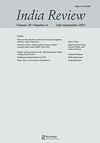Financial liberalization during the Modi government: Political and economic implications
IF 0.5
3区 社会学
Q3 AREA STUDIES
引用次数: 0
Abstract
ABSTRACT Financial liberalization has been a gradual, calibrated and uneven process in India. Since the early 90s, Indian financial system has been transformed in accordance with a market-led economic strategy aiming to attract foreign investments and prepare its integration into the international financial circuits, through institutional changes, regulatory easing, public monopolies ending, etc. A few years after the 2008 global financial crisis, during the Modi government, the financial liberalization process has been significantly renovated and reinforced. In addition, old and new challenges have been (re)emerged, and domestic and external factors also have had considerable impacts by unveiling and aggravating systemic fragilities. In this context, the objective of this article is to analyze the financial deregulation process and its political and economic implications for India in the course of Modi’s first government, in view of the foreign investments, the banking system, the insurance sector and the monetary policy.莫迪政府时期的金融自由化:政治和经济影响
在印度,金融自由化是一个渐进的、有标准的、不平衡的过程。自20世纪90年代初以来,印度金融体系已经按照市场主导的经济战略进行了转型,旨在通过制度变革、放松监管、结束公共垄断等方式吸引外国投资,并为融入国际金融体系做准备。2008年全球金融危机后的几年,在莫迪政府期间,金融自由化进程得到了显著的更新和加强。此外,新旧挑战层出不穷,内外因素暴露和加剧了系统性脆弱性,也产生了相当大的影响。在此背景下,本文的目的是分析莫迪第一届政府期间金融放松管制的过程及其对印度的政治和经济影响,考虑到外国投资、银行体系、保险部门和货币政策。
本文章由计算机程序翻译,如有差异,请以英文原文为准。
求助全文
约1分钟内获得全文
求助全文

 求助内容:
求助内容: 应助结果提醒方式:
应助结果提醒方式:


